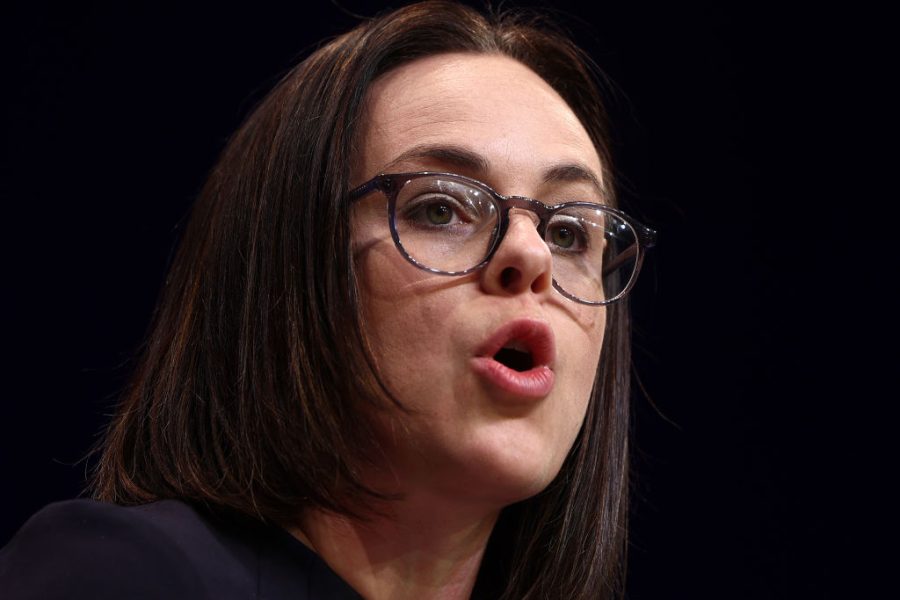In little over a week, the Scottish National Party (SNP) has lost two of its greatest political stars. Mhairi Black, the left-wing MP for Paisley and Renfrewshire South, threw in the towel last week, citing the ‘toxicity’ of politics and the party’s lack of support for transgender rights. Now, the deputy leader of the SNP, Kate Forbes – regarded as a social conservative – has stepped down to spend more time with her family. The trickle of nationalist departures risks turning into a flood.
Forbes’s departure is the greater shock. Many regarded the 35-year-old MSP for Skye, Lochaber and Badenoch as the leading leadership challenger from the right of the party. As the SNP’s first female Finance Secretary, she championed a return to pro-business economics and strongly defended the oil and gas industry. Her statement today that she doesn’t want to miss ‘the precious early years of family life’ – she has a three-year-old daughter – came as a complete surprise.
The loss of two high-profile women only adds to the sense that the SNP has lost direction
Mhairi Black, on the other hand, had long expressed her disillusionment with Westminster politics and had made it clear last year that she was standing down as an MP. However, her many supporters on the left of the SNP hoped she might seek a political future in Holyrood. Instead, she announced on 25 July that she was quitting the SNP for good.
Black was highly regarded as an articulate and dynamic champion of the youth vote. When she was elected to Paisley and Renfrewshire South in 2015, defeating the Labour cabinet minister Douglas Alexander, she became the youngest MP to be elected since 1832 at 20 years old. Black went on to become deputy leader of the SNP in Westminster and, with a prominent media profile, including a show at the Edinburgh Festival, was seen by many as the future of Scottish nationalism.
But last week, she cited the SNP leadership’s ‘capitulations on LGBT rights, trans rights in particular’ as the reason she could no longer remain a party member. She also criticised the SNP leader, John Swinney, for equivocating on the issue of Palestinian ‘genocide’. There is little doubt that Black regarded Kate Forbes as a leading figure in those ‘capitulations’.
The deputy leader made clear that she ‘unequivocally’ supported ‘single-sex spaces and women’s rights’, and Forbes openly praised the gender-critical author J.K. Rowling as a ‘national treasure’. A committed Christian and member of an evangelical sect, Forbes also said she personally did not support abortion, although she accepted that it was the law of the land. She admitted that she would have voted against same-sex marriage had she been in Holyrood when the matter was debated in 2012.
Black argued that the SNP could not remain a party of young people while clinging to such policies. Centrists may argue that the departures of these two controversial figures, in a sense, cancel each other out, allowing the party to stabilise behind John Swinney, the ultimate centrist dad. But this development will only further demoralise the party as it seeks to avoid defeat in next year’s Holyrood election and has barely recovered from its drubbing in last year’s general election when it lost 38 seats.
The loss of two high-profile women only adds to the sense that the SNP has lost direction since the equally sudden departure of former first minister Nicola Sturgeon in February 2023. Of course, many will blame the difficulties that women face in politics, though neither Sturgeon nor Mhairi Black had young children to look after. The attrition rate for female politicians in Scotland is high. The former women leaders of the Scottish Labour party, Kezia Dugdale, and the Scottish Conservatives, Ruth Davidson, also left politics at short notice.
However, as far as the SNP is concerned, it is probably more a consequence of the failure of nationalist politics than of personal issues or misogyny. Kate Forbes stood for the party leadership as recently as 2023 and lost narrowly to Humza Yousaf, who is himself standing down at next year’s Holyrood elections. The former SNP minister, Fergus Ewing, who left the party last month, has said: ‘With Alex Salmond’s passing last year, the SNP lost the best leader it ever had; with Kate’s decision, the SNP has lost the best leader it never had.’ The SNP has haemorrhaged electoral support since the departure of Nicola Sturgeon and is now polling in the low 30s.
The current leader, John Swinney, has been heavily criticised for his lacklustre leadership and his failure to translate support for independence, which is running at over 50 per cent in many recent opinion polls, into support for the party of independence. This latest shock will only increase murmurs of discontent about Swinney’s leadership. The main beneficiary is likely to be the party’s Westminster leader, Stephen Flynn, who is beginning to look like a shoo-in for SNP leader if and when John Swinney takes the long walk.








Comments